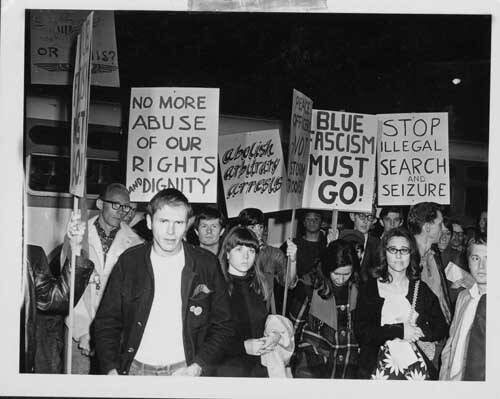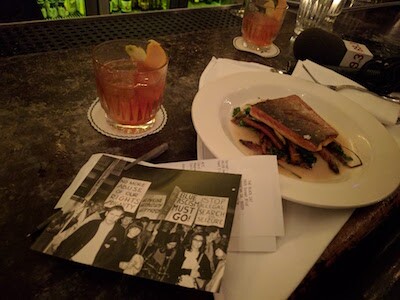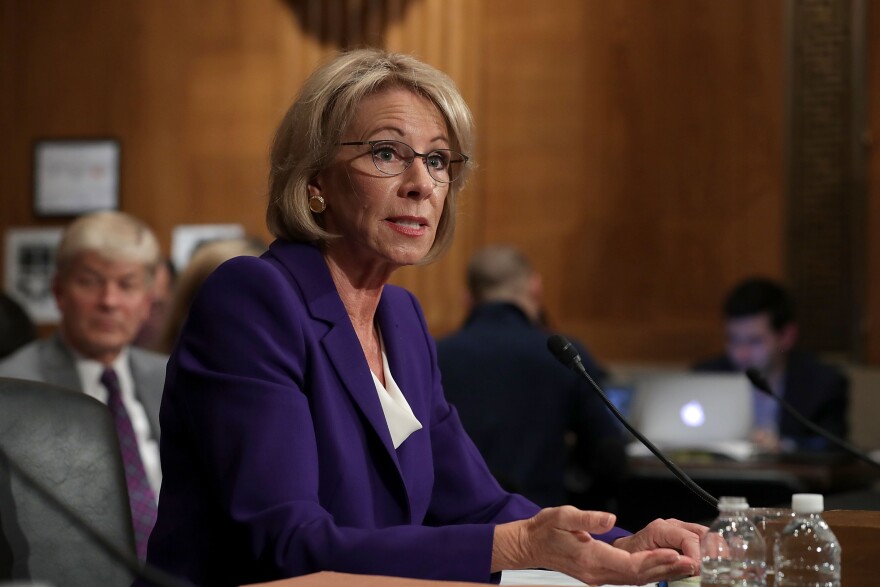Betsy Devos is confirmed as the new Secretary of Education. What will this mean for California? Plus an increase in heroin addiction among millennials and new music offerings from Goldfrapp and Bel Biv Devoe.
One of nation's 1st organized LGBT protests was 50 years ago in LA
The history of LGBT rights in America often starts with the rioting and protests at New York’s Stonewall Inn in 1969.
But one of the country’s first large-scale and organized LGBT demonstrations actually happened over two years before that in L.A.

The story of the riot and protest at the Black Cat Tavern starts a half-century ago.
Alexei Romanoff, 80, was 30-years-old at the time.
“I have pictures of me back then. I thought I looked pretty good!" he laughs.
But then he gets serious when he remembers what happened to his friends on New Year’s Day, 1967, at the Black Cat Tavern.
Partiers inside the Silver Lake gay bar were counting down to midnight.
"Auld Lang Syne started to play," he says. “People instinctively went over and hugged and kissed each other."
But the police were there, too. Undercover.
“Two males kissing each other was against the law. Police were grabbing them and tearing them apart," says Romanoff.
By dawn, more than a dozen people were arrested. Two of the men caught kissing eventually had to register as sex offenders.
And gay people like Romanoff were incensed.
"Once again we’re being picked on," he says.
In the weeks afterwards, he helped to organize one of the first large-scaled and documented protests for LGBT rights in America.
It was February 11, 1967.
More than 500 people gathered back outside the Black Cat for a somber, serious march.

“They were terrified," remembers Romanoff. "People would go by, roll their windows down in the cars, and would say, you should be ashamed of yourself."
But the event had a major impact.
For example, the group that organized it was called Personal Rights in Defense and Education.
Romanoff says the acronym – PRIDE – was the first time the word was used as part of the gay rights struggle.
PRIDE's newsletter, the PRIDE Advocate, eventually transformed into The Advocate magazine, which still exists today as the nation's longest-running LGBT publication.
The Black Cat Tavern itself, however, didn’t have nine lives.
It closed just a few months afterwards because it couldn't do business when the city revoked its liquor license.
The space housed a string of other bars with other names since that time.
Then in 2012, a gastropub took it over. It’s called The Black Cat.
The return of the name isn’t a coincidence.
Owner Lindsay Kennedy found out about the building’s history when he was developing the restaurant.
He’s not LGBT himself, but he wanted to honor that past by dubbing it The Black Cat.
“We make it a point to educate our staff about the history of this place," he says. "It’s part of our employee handbook.”

Kennedy was also able to find the only five pictures that exist from the 1967 protest, and frame them on the restaurants walls. Every check also comes with a postcard featuring one of those pictures.
But the reason that there are just five images is one of the reasons the Black Cat protest isn't as well-known as the riots and protests at Stonewall.
Just a small alternative newspaper, The Free Press, was there to document that single night, which is where the pictures came from.
But the major national and internationally newspapers based in New York couldn’t ignore the days-long riots at Stonewall that drew thousands.
So that event grabbed the spotlight in history.
The Black Cat protest, however, is no longer being ignored.
Last Saturday night on the protest's 50th anniversary, hundreds of people gathered back on the same block to recreate history.

Marchers remade signs from the original demonstration and paced in front of The Black Cat restaurant chanting phrases like, "Hey hey, ho ho, police brutality has got to go!"
LAPD officers and city officials including Mayor Eric Garcetti were there, too. But they weren't there to crackdown on people – they cheered them on. Several out LGBT police officers also spoke before the crowd to say that they are committed to building trust with the community.
One of the celebration's speakers Paul Katami, a co-plaintiff in the Supreme Court case against California's Prop 8, also asked the crowd to redo that New Year's eve.
"Let's have a 1967 kiss-in!" he shouted.
And as people turned to each other and kiss to Auld Lang Syne, there were no arrests.
Just cheers, smiles and pride.
Note: this story has been updated with copy appearing in a NPR report on the subject. It has also been corrected to show that the Black Cat protest was just one of the first large-scale LGBT demonstrations in the country. Several smaller protests occurred in the years prior.
How could DeVos' priorities affect California schools?
CORRECTION: In this Interview we incorrectly identified Maggie Hassan as a senator from New Jersey. She is from New Hampshire. We apologize for the error.
Today's Senate confirmation of Betsy DeVos for Secretary of Education comes amid controversy around her political contributions and her polarizing stance on charter schools.
But one issue that's important to California is how much federal funding comes through to local schools – especially for the kinds of programs designed to ensure that students who have special needs, or come from low-income families, still get a high quality education.
A lot of that funding comes from Title I, which also goes to preschool and arts programs. While significant changes to funding need Congressional approval, the Secretary does have influence over setting priorities.
The public may soon get a clearer picture of what those priorities are for the White House, said POLITICO Education Reporter Caitlin Emma.
"What will be interesting is to watch how much money will be requested for Title I in the Trump Administration," said Emma. "I think a lot of folks are watching that closely."
City College of San Francisco becomes first tuition free community college
The idea of a publicly funded education goes back all the way to the Founding Fathers. It's not too often I get to quote John Adams, but here's what he wrote way back in 1785:
"The whole people must take upon themselves the education of the whole people and must be willing to bear the expense of it."
Easier said than done, John.
It wasn't until well into the 20th century that the entire country embraced public schools for all children. Now, there's a push to expand the concept to higher ed. Politicians have made "free college" a campaign rhetoric staple over the years but with no success.
Until now. Free college. It's happening, right here in California.
City College of San Francisco has become the first free community college in the country. Come Fall 2017 San Francisco residents can attend and won't have to pay tuition fees.
For more on the announcement and what it entails, A Martinez spoke with Ron Gerhard. He's the Vice chancellor of finance and administration at the community college.
To hear the full segment, click the blue play button above.
LA's heroin problem is hitting millennials hard
New data from California officials is shining a light on heroin use in the Los Angeles area, particularly among young people.
The number of L.A. millennials admitted for overdoses to emergency rooms doubled between the first nine months of 2010 and the same period in 2016.
It's a reality that addiction counselor Jody Waxman faces every day.
"Heroin is easy to get," Waxman says. "You have these young kids who are trying to get rid of the emotional pain and trauma that they've had in their lives and the way that they deal with it is to use and get high."
For years, heroin was seen as a drug of the inner cities, but that's changed. Waxman herself is a case in point.
Three years ago, Waxman and her family were living a middle-class life in the San Fernando Valley. She was active in a parental support group for families struggling with issues like addiction. Then, one day her son called her and made a confession:
"I got a call before the group started that said, 'Mom, I'm a heroin addict, and I need help,'" Waxman says. "It was pretty surprising. My kid was 22 years old, and I had no idea."
Waxman says the signs were there, but it took her some time to see them. Her son's addiction led her to become a certified addiction counselor. She now works with parents who find themselves in the same position.
When asked about the rise of heroin use in California, Waxman points the finger at doctors.
"I'm glad that you can't get the pain medications that you were getting before — that they've put a stop to that — but I think that doctors have really gotten people hooked on that pain medication and now that they can't get it on a regular basis, they have to go toward something else," she says.
That "something else" is heroin. Most of it flows into the U.S. from south of the border or Southwest Asia. Waxman says it's relatively easy to find and inexpensive. And that leaves her doubtful that the problem will ever get solved unless parents change their approach.
"Are we ever going to stop the heroin? No, I don't think so," Waxman says. "But are we going to be able to educate parents to help their child understand that if you do it one time you can become addicted to it?"
Press the blue play button above to hear more.
What do changes to Medicaid mean for California's undocumented children?
The planned repeal of the Affordable Care Act has many in California asking how it could affect the state's current healthcare programs. With changes to Medicare funding on the horizon, concerns are growing over what it could mean for the health of California's undocumented children.
Take Two's A Martinez sat down with Elizabeth Aguilera who has been looking in to this for CALmatters - a non profit reporting project that focuses on public policy issues in the state.
Highlight
Until last May, undocumented kids were not eligible for full scope Medi-Cal and then that changed. In 2015, the legislature approved this bill, the governor signed it, and then kids were eligible for full scope. And that's basically medical insurance. It includes dental care, it includes mental health services. Sort of your full scope medical insurance.
There are now 164,000 kids registered across the state. And the biggest group is here in Los Angeles County. There are 65,000 kids on it.
Several experts predict... that this program could be in danger if the federal government makes the changes they plan to make to the Affordable Care Act, and if they change Medicaid. Specifically the Medicaid funding. Medi-Cal in California if the Medicaid program here, we just call it something different.
The new administration favors going to a block grant system. And what that means is, every state will get a certain amount of funds. That's it. So the concern is, the state legislature will have to decide who's going to continue to be covered. And because these children were the last ones in the program, and some critics argue that you have to focus on citizens and legal residents first, they could also be the first out.
To hear the full interview, click on the Media Player above.
Tuesday Reviewsday: new music from Bell Biv DeVoe, Omar, Kid Koala and more
If you love music, but don't have the time to keep up with what's new, we've got the solution ... Tuesday Reviewsday.
Every week our critics join our hosts in the studio to talk about what you should be listening to in one short segment. This week we're joined by music supervisor Morgan Rhodes and Oliver Wang from Soul-Sides.com.
Oliver's picks
Bell Biv DeVoe - Album: Three Stripes (Finally)
There’s a cognitive dissonance in thinking about BBD releasing a new album in 2017 but with that recent, well-received BET series on the history of New Edition, they decided to join forces again and release their first new album in 15 years. This song features them + SWV so it’s like a ‘90s R&B reunion. On one hand, BBD still sound like BBD. On the other hand, I don’t know if new jack swing ages well in a 2017 context.
Kid Koala / Emiliana Torrini - Album: Music to Draw To: Satellite (The Hubble Constant)
Kid Koala made his name as one of the most musically creative DJs to emerge out of the 1990s turntablist movement and this Montreal artist has continued to branch into compelling new directions. This time, he’s working with Icelandic vocalist Emiliana Torrini.
Morgan's picks
Omar - Album: Love In Beats (De Ja Vu feat Maya Andrade)
No discussion of the birth of Neo Soul is complete without mentioning Omar Lye Fooks name and myriad contributions. He is without question one of the elder statesmen of the genre and his latest offering Love In Beats is reminiscent of the golden age of the genre. No Omar record is complete without a dope collaboration and De Ja Vu pairs him with Cape Verdean singer Maya Andrade.
Cece Winans - Album: Let Them Fall In Love (Lowly)
It's been almost 7 years since her last album, but CeCe Winans is back with a new album that is unlike anything she's released to date. She had me at the lead off single, but the song I brought is a thing of beauty called Lowly.




